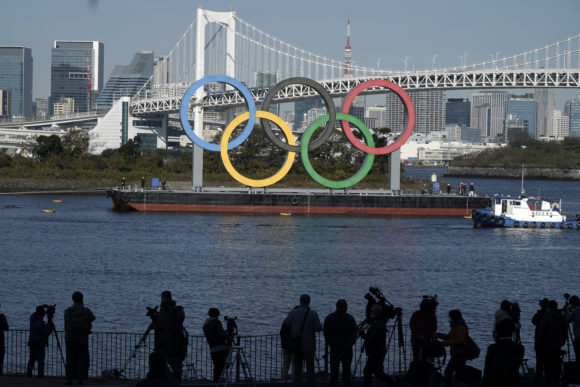Japan has imposed a state of emergency in its capital Tokyo, to be in force during the Summer Olympic Games 2020 to be held in the city from July 23 to August 8. The step has been taken to keep spectators out of the stadiums in view of a recent surge in Covid infections, especially the Delta variant. Earlier, the government had decided to allow entry to a limited number of spectators, for which tickets have already been sold. What has surprised the international community is the insistence by the International Olympic Committee (IOC) that the show must go on even though about 80 per cent of Japan’s population wants the games to be postponed and the country spared of the consequences of another Covid surge. The survey was conducted by Japan’s leading daily Asahi Shimbun which has also joined the chorus for postponing the games.
The Paralympic Games will be held between August 24 and September 5 and the Japanese government will take a call on the question of letting in spectators by July 16. The 2020 Olympics and Paralympics were postponed last year because of the pandemic. The Olympics now will feature 33 sports at 339 events across 42 venues. The Paralympics will feature 22 sports at 539 events across 21 venues. Most events will be in the Greater Tokyo area, although some football games and the marathon will take place in the northern city of Sapporo.
Japan has had relatively low Covid caseload, but a new wave of infections began in April. Figures till July 8 reveal there are about 812,000 confirmed cases and 14,848 deaths. What causes concern is the fact that Japan began vaccinating people only in February, which is much later than most other developed countries. Just over 15 per cent of Japan’s population of about 126 million is fully vaccinated. In Tokyo and Osaka, the two cities hit the hardest by the recent surge, authorities hope people over 65 years will be fully vaccinated by end July. The youth of the country are now the most vulnerable as they are yet to be covered by vaccination.
In May, a Japanese doctors’ union said it was ‘impossible’ to hold the games, given the pandemic. A number of sports bodies and experts have expressed similar concern. The World Players Association, representing 85,000 athletes in over 60 countries, said the IOC must ensure athletes’ safety. Japanese athletes have largely kept a low profile, but the country’s biggest sports star, tennis champion Naomi Osaka, has stated there should be a debate about whether the games should be held at all. Olympics-related events have already spread the virus among those helping to run the event. In May, eight people involved in the torch relay were infected with the virus.
Currently, there is a ban on entry to Japan of foreigners from 159 countries, including the UK. It indeed seems like a joke to organise the biggest international sporting event in such a situation. This reminds one of an old counter-culture saying that went ‘What if they declared war and no one turned up?’ Question is why Japan is willing to take such high risks of organising the Olympics for which about 60,000 athletes, coaches, journalists and others will travel to the country. Health experts, both in Japan and outside, have voiced their concern that the Olympics could be a springboard for the Covid outbreak across the country and possibly spread across the globe. Surely, the mega meet gives athletes the opportunity of a lifetime to showcase their talent and get international acclaim. But it is difficult to assess whether the games are being held for the athletes, corporates or for some other reasons. Since the corporates are also cribbing in the changed circumstances of total ban on spectators and involvement of less number of countries, it is worth questioning the reasoning of the Japanese government.
Apparently, the athletes and sports enthusiasts have been taken for a ride by colossal commercial interests involved in organising the games. The contract between the IOC and the host city Tokyo made it clear only the IOC could cancel the event. The IOC is reported to make around 70 per cent of its money from broadcast rights, and 18 per cent from sponsorships. Naturally, it has no compunction in insisting the games can go ahead safely, if necessary, under a state of emergency which is exactly what the Japanese government has done. The latter’s worry apparently stems from the fact that if Tokyo cancels the games, it will entail breach of contract and Japan will have to compensate the IOC for the financial loss. The budget for Tokyo 2020 was set at $12.6bn (£8.9bn), though the actual cost is reported to be much higher.
Only solace for us Indians is that, now after seeing Japan and the mental health issues that the Japanese government seems to be suffering from, our government’s oddities and idiosyncrasies seem sort of acceptable if not welcome.
